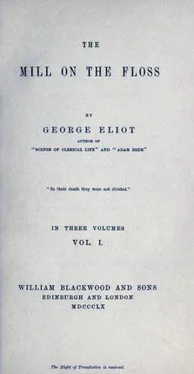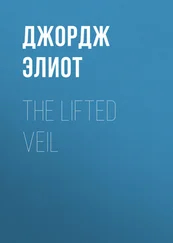As for dear little Lucy herself, her late benevolent triumph about the Mill, and all the affectionate projects she was cherishing for Maggie and Philip, helped to give her the highest spirits to-day, and she felt nothing but pleasure in the evidence of Maggie's attractiveness. It is true, she was looking very charming herself, and Stephen was paying her the utmost attention on this public occasion; jealously buying up the articles he had seen under her fingers in the process of making, and gayly helping her to cajole the male customers into the purchase of the most effeminate futilities. He chose to lay aside his hat and wear a scarlet fez of her embroidering; but by superficial observers this was necessarily liable to be interpreted less as a compliment to Lucy than as a mark of coxcombry. "Guest is a great coxcomb," young Torry observed; "but then he is a privileged person in St. Ogg's — he carries all before him; if another fellow did such things, everybody would say he made a fool of himself."
And Stephen purchased absolutely nothing from Maggie, until Lucy said, in rather a vexed undertone,–
"See, now; all the things of Maggie's knitting will be gone, and you will not have bought one. There are those deliciously soft warm things for the wrists, — do buy them."
"Oh no," said Stephen, "they must be intended for imaginative persons, who can chill themselves on this warm day by thinking of the frosty Caucasus. Stern reason is my forte, you know. You must get Philip to buy those. By the way, why doesn't he come?"
"He never likes going where there are many people, though I enjoined him to come. He said he would buy up any of my goods that the rest of the world rejected. But now, do go and buy something of Maggie."
"No, no; see, she has got a customer; there is old Wakem himself just coming up."
Lucy's eyes turned with anxious interest toward Maggie to see how she went through this first interview, since a sadly memorable time, with a man toward whom she must have so strange a mixture of feelings; but she was pleased to notice that Wakem had tact enough to enter at once into talk about the bazaar wares, and appear interested in purchasing, smiling now and then kindly at Maggie, and not calling on her to speak much, as if he observed that she was rather pale and tremulous.
"Why, Wakem is making himself particularly amiable to your cousin," said Stephen, in an undertone to Lucy; "is it pure magnanimity? You talked of a family quarrel."
"Oh, that will soon be quite healed, I hope," said Lucy, becoming a little indiscreet in her satisfaction, and speaking with an air of significance. But Stephen did not appear to notice this, and as some lady-purchasers came up, he lounged on toward Maggie's end, handling trifles and standing aloof until Wakem, who had taken out his purse, had finished his t transactions.
"My son came with me," he overheard Wakem saying, "but he has vanished into some other part of the building, and has left all these charitable gallantries to me. I hope you'll reproach him for his shabby conduct."
She returned his smile and bow without speaking, and he turned away, only then observing Stephen and nodding to him. Maggie, conscious that Stephen was still there, busied herself with counting money, and avoided looking up. She had been well pleased that he had devoted himself to Lucy to-day, and had not come near her. They had begun the morning with an indifferent salutation, and both had rejoiced in being aloof from each other, like a patient who has actually done without his opium, in spite of former failures in resolution. And during the last few days they had even been making up their minds to failures, looking to the outward events that must soon come to separate them, as a reason for dispensing with self-conquest in detail.
Stephen moved step by step as if he were being unwillingly dragged, until he had got round the open end of the stall, and was half hidden by a screen of draperies. Maggie went on counting her money till she suddenly heard a deep gentle voice saying, "Aren't you very tried? Do let me bring you something, — some fruit or jelly, mayn't I?"
The unexpected tones shook her like a sudden accidental vibration of a harp close by her.
"Oh no, thank you," she said faintly, and only half looking up for an instant.
"You look so pale," Stephen insisted, in a more entreating tone. "I'm sure you're exhausted. I must disobey you, and bring something."
"No, indeed, I couldn't take it."
"Are you angry with me? What have I done? Do look at me."
"Pray, go away," said Maggie, looking at him helplessly, her eyes glancing immediately from him to the opposite corner of the orchestra, which was half hidden by the folds of the old faded green curtain. Maggie had no sooner uttered this entreaty than she was wretched at the admission it implied; but Stephen turned away at once, and following her upward glance, he saw Philip Wakem sealed in the half-hidden corner, so that he could command little more than that angle of the hall in which Maggie sat. An entirely new though occurred to Stephen, and linking itself with what he had observed of Wakem's manner, and with Lucy's reply to his observation, it convinced him that there had been some former relation between Philip and Maggie beyond that childish one of which he had heard. More than one impulse made him immediately leave the hall and go upstairs to the refreshment-room, where, walking up to Philip, he sat down behind him, and put his hand on his shoulder.
"Are you studying for a portrait, Phil," he said, "or for a sketch of that oriel window? By George, it makes a capital bit from this dark corner, with the curtain just marking it off."
"I have been studying expression," said Philip, curtly.
"What! Miss Tulliver's? It's rather of the savage-moody order to-day, I think, — something of the fallen princess serving behind a counter. Her cousin sent me to her with a civil offer to get her some refreshment, but I have been snubbed, as usual. There's natural antipathy between us, I suppose; I have seldom the honor to please her."
"What a hypocrite you are!" said Philip, flushing angrily.
"What! because experience must have told me that I'm universally pleasing? I admit the law, but there's some disturbing force here."
"I am going," said Philip, rising abruptly.
"So am I — to get a breath of fresh air; this place gets oppressive. I think I have done suit and service long enough."
The two friends walked downstairs together without speaking. Philip turned through the outer door into the court-yard; but Stephen, saying, "Oh, by the by, I must call in here," went on along the passage to one of the rooms at the other end of the building, which were appropriated to the town library. He had the room all to himself, and a man requires nothing less than this when he wants to dash his cap on the table, throw himself astride a chair, and stare at a high brick wall with a frown which would not have been beneath the occasion if he had been slaying "the giant Python." The conduct that issues from a moral conflict has often so close a resemblance to vice that the distinction escapes all outward judgments founded on a mere comparison of actions. It is clear to you, I hope, that Stephen was not a hypocrite, — capable of deliberate doubleness for a selfish end; and yet his fluctuations between the indulgence of a feeling and the systematic concealment of it might have made a good case in support of Philip's accusation.
Meanwhile, Maggie sat at her stall cold and trembling, with that painful sensation in the eyes which comes from resolutely repressed tears. Was her life to be always like this, — always bringing some new source of inward strife? She heard confusedly the busy, indifferent voices around her, and wished her mind could flow into that easy babbling current. It was at this moment that Dr. Kenn, who had quite lately come into the hall, and was now walking down the middle with his hands behind him, taking a general view, fixed his eyes on Maggie for the first time, and was struck with the expression of pain on her beautiful face. She was sitting quite still, for the stream of customers had lessened at this late hour in the afternoon; the gentlemen had chiefly chosen the middle of the day, and Maggie's stall was looking rather bare. This, with her absent, pained expression, finished the contrast between her and her companions, who were all bright, eager, and busy. He was strongly arrested. Her face had naturally drawn his attention as a new and striking one at church, and he had been introduced to her during a short call on business at Mr. Deane's, but he had never spoken more than three words to her. He walked toward her now, and Maggie, perceiving some one approaching, roused herself to look up and be prepared to speak. She felt a childlike, instinctive relief from the sense of uneasiness in this exertion, when she saw it was Dr. Kenn's face that was looking at her; that plain, middle-aged face, with a grave, penetrating kindness in it, seeming to tell of a human being who had reached a firm, safe strand, but was looking with helpful pity toward the strugglers still tossed by the waves, had an effect on Maggie at this moment which was afterward remembered by her as if it had been a promise. The middle-aged, who have lived through their strongest emotions, but are yet in the time when memory is still half passionate and not merely contemplative, should surely be a sort of natural priesthood, whom life has disciplined and consecrated to be the refuge and rescue of early stumblers and victims of self-despair. Most of us, at some moment in our young lives, would have welcomed a priest of that natural order in any sort of canonicals or uncanonicals, but had to scramble upward into all the difficulties of nineteen entirely without such aid, as Maggie did.
Читать дальше












